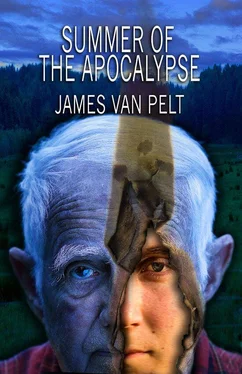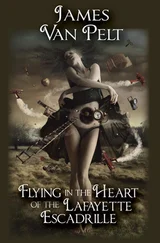In wonder, Eric replaced the disk. All was not lost. The building was gone and the books burned. The library, however, still stood. He rested his palm on the top of the disks. From little finger to thumb, how many millions of words? he thought. How big a pile would the tomes beneath his hand make? Then, suddenly, in swelling horror, he thought of something else. “All the library’s books?” he said. “The Chem and Biology libraries too?”
“Yes.”
He fell against the stone wall, pressing the back of his wrist to his mouth. An image flashed before him again of the pile of books starting to burn, of Rabbit tossing away the first fire-brand, of the rifle coming down. The futility of it. The stupid, misguided futility of his gesture. That was all it could be. Rabbit had to have known when he’d dashed into the quad that he couldn’t stop all those men. He must have known. In each niche, hundreds of disks stood upright in their marble slots, each tray sporting a number carved into its base. They glinted sharp light back to him as Eric passed. I wanted this, he thought, for the library to be here and all the learning saved for my son and grandson. I wanted to build cars again, planes, schools, hospitals….
In Littleton, Dodge and Rabbit had brought him books. They dug deep, bringing him poetry and texts, and manuals and novels. Rabbit always brought the most. Quietly he’d lay the book down, waiting for Eric to pick it up, to nod approval or pat him on the hand. “Books, boys, it’s books that will save us,” he’d told them. “Books will make man great again.”
The labor to carve this crypt and to preserve the library staggered him. But a vision of the stack of burning books that Rabbit tried to save rose up within. Looking at all the disks in the niche before him, stepping back so he could survey the other niches circling the room and reaching to the ceiling, Eric couldn’t justify Pope’s effort. The room and what it represented lost its magic. It was just a stone cold tomb. A museum not of the old, but of the alien, of a world that no longer existed and could never exist again. The chamber was a sepulcher of the Gone Time. “Come on,” he said to Dodge, Teach and Ripple,
“We need to go home.”
“Eric,” said the woman, “stay. You’re the last of the Gone Timers. This is your place.” They headed toward the exit where stairs led to the surface. The old woman looked beseechingly at him, then bent into a niche, reaching in as if to make some minute adjustment to a disk. “Maybe the Turks at Alexandria,” Eric added, “knew what they were doing.”
Late in the afternoon, a few miles west of Boulder where the first of the foothills cupped the two-lane highway out of town, Eric slogged determinedly forward. Not only did the broken shoulder throb with every stride, but his whole left side felt bruised. The first hour or so of hiking had loosened it some, but now the pain intensified the farther they walked. He’d leaned gratefully on Dodge several times. Soon, though, they outpaced him. They were a hundred yards ahead and out of sight. “Go on,” he’d said. “Need some time to think, that’s all.”
From Boulder, a thick column of black smoke rose straight up, marking the ruins of the smoldering campus. Before they’d left, Teach had reconnoitered, but found no sign of Federal’s men. “Lots of melted guns,” he had said. “The tents were full of them.”
The road wound steadily uphill, and Eric watched his step. Years of thawing and freezing had buckled the asphalt and made walking difficult. Waist-high, scraggly limbed, loose-barked bushes poked up here and there, so the hike was more a matter of weaving than a straight path.
For the first time, instead of thinking about clearing the brush and estimating how much work it would take to recondition the road, he thought of the inexorable progress of change. In another hundred years, he thought, no one will know that this was ever a highway. Why, a person hiking the other direction in two-hundred years might well think that no other human being had ever been there, and if he continued on, only right-angled mounds of brick will mark the foundations of the buildings in Boulder. A hunk of cement sitting in the middle of a field, vines growing all over it, might be all that’s left of an overpass. He might dig himself a fire-pit and find some other remnants, a key-chain maybe, or a beer bottle. Eric imagined the hiker turning the dirt-crusted bottle over in his hands, watching how the firelight cut through the muddy-colored glass. He would have come from a mountain community, High Water perhaps, one of the first explorers, pushing the boundaries of his world, hoping that the poisons had receded and the world was safe for people again. He would put the bottle aside, finally, and make his bed next to the fire, and then, before he went to sleep, he’d look up at the stars and make up stories about them, never knowing that mankind had once aspired to visit them, had once seen themselves as the inhabitants of a tiny planet, circling a star as beautiful and remote as the ones that wheeled over his head right now. He’d sleep, his next frontier the hill he hadn’t hiked over yet. To him, the world would be new again, filled with wonder and danger, a place to learn from.
The image of the future hiker didn’t seem either good or bad, just interesting. The sun now nearly touched the hills ahead, and the shadows lay long behind him. In the still air, the steady chirping of mountain wrens and the crackle of the occasional twig or dry leaf underfoot were the only sounds. He hadn’t seen Teach and the children for some time, and the stiffness in his legs as he climbed toward High Water slowed him considerably.
To loosen his calves, he walked backwards a few feet. Boulder’s plume of smoke hazed the air. It’s like Golden, he thought, years ago when I first came out of the mountains looking for Dad. The feeling of experiencing it again swept over him powerfully. Goose-bumps raised on his back and legs. Smoke in the sky, he thought. A city is burning, and I’m searching.
The sense of then and now filled Eric so thoroughly, the sense of connection with himself at fifteen and himself at seventy-five felt so solid, that he almost wasn’t surprised when he turned around and saw striding toward him down the road, the figure of a man who could easily be his father. Dodge held the black-haired man’s hand. Behind him, came Teach and Ripple.
“Troy,” said Eric.
They stopped, a few feet apart. Dodge looked from his grandfather to his father and back expectantly.
“I searched for you,” said Troy. “I was worried… you know… the boy. I didn’t think you were serious.”
In wonder, Eric saw that Troy’s eyes were glistening, that he was shaking. Troy said, “I thought you were gone forever, Dad. You never said goodbye.” Silence stretched between them. The feeling of connection held on. Eric felt fifteen; he felt seventy-five. He was a son searching for his father; he was the father the son found. Everything circled around, he thought. Everything circled around.
He said, because he knew it was the only thing to say, the words that had been written but never spoken, the words he had carried with him for sixty years, “I have always loved you, son.” Late that night, in their campsite beneath two old pines, Eric suddenly awoke. Only moonlight cast any illumination. The hillside glowed with its light. He canted his head from one side to another. Was that a bird? he thought, or did I only dream it? It was a bird, a meadowlark. I know that call; my father taught me.
James Van Pelt grew up in Littleton, Colorado, where his dad worked for Martin-Marietta designing rockets, and Sky and Telescope magazines were neatly stacked on the coffee table for light reading. His mom, a voracious reader, encouraged James by buying books whenever he wanted them and giving him the freedom to read (as long as she didn’t check on him too often long after he was supposed to be asleep).
Читать дальше












